Business Law and Ethics Report: The Bhopal Gas Tragedy Analysis
VerifiedAdded on 2022/12/28
|7
|1902
|69
Report
AI Summary
This report provides an in-depth analysis of the Bhopal Gas Tragedy, examining the disaster from a business law and ethics perspective. It begins with an introduction to business law and ethical principles, emphasizing the importance of ethical conduct and corporate social responsibility (CSR). The main body of the report details the events of the Bhopal Gas Tragedy, the unethical practices of Union Carbide India Limited (UCIL), and the role of its parent company, Union Carbide Corporation (UCC). It explores the ethical issues that led to the disaster, including negligence in maintenance, lack of worker training, and cost-cutting measures that compromised safety. The report references ethical codes of conduct, such as those from the National Society of Professional Engineers (NSPE), to evaluate the ethical failures. It also discusses the lack of CSR demonstrated by the company, particularly in its denial of responsibility and failure to remediate environmental damage. The report concludes by highlighting the need for companies to adhere to ethical principles and fulfill their responsibilities to society and the environment, emphasizing that ethical conduct is crucial for long-term business success. The provided references support the analysis with relevant literature on the subject.
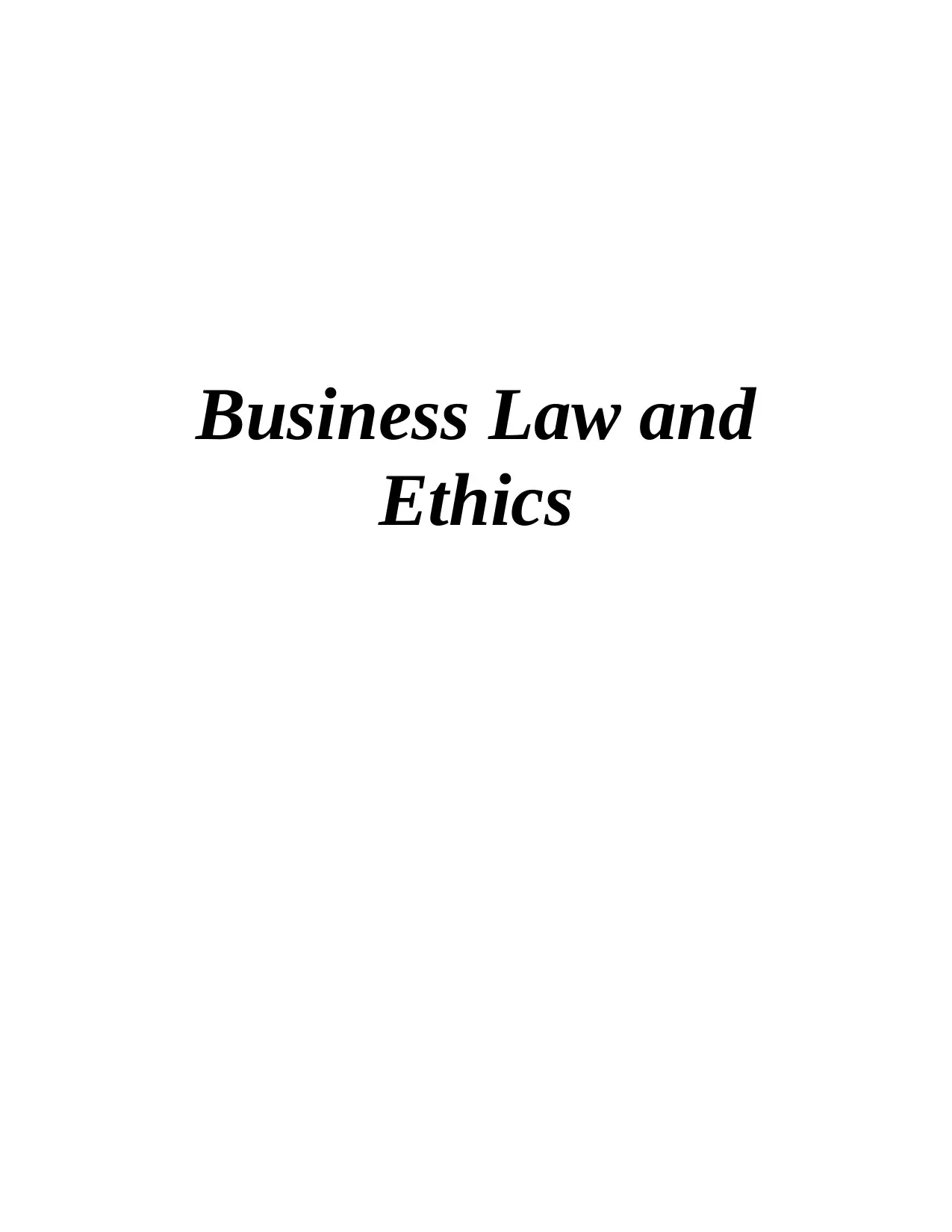
Business Law and
Ethics
Ethics
Paraphrase This Document
Need a fresh take? Get an instant paraphrase of this document with our AI Paraphraser
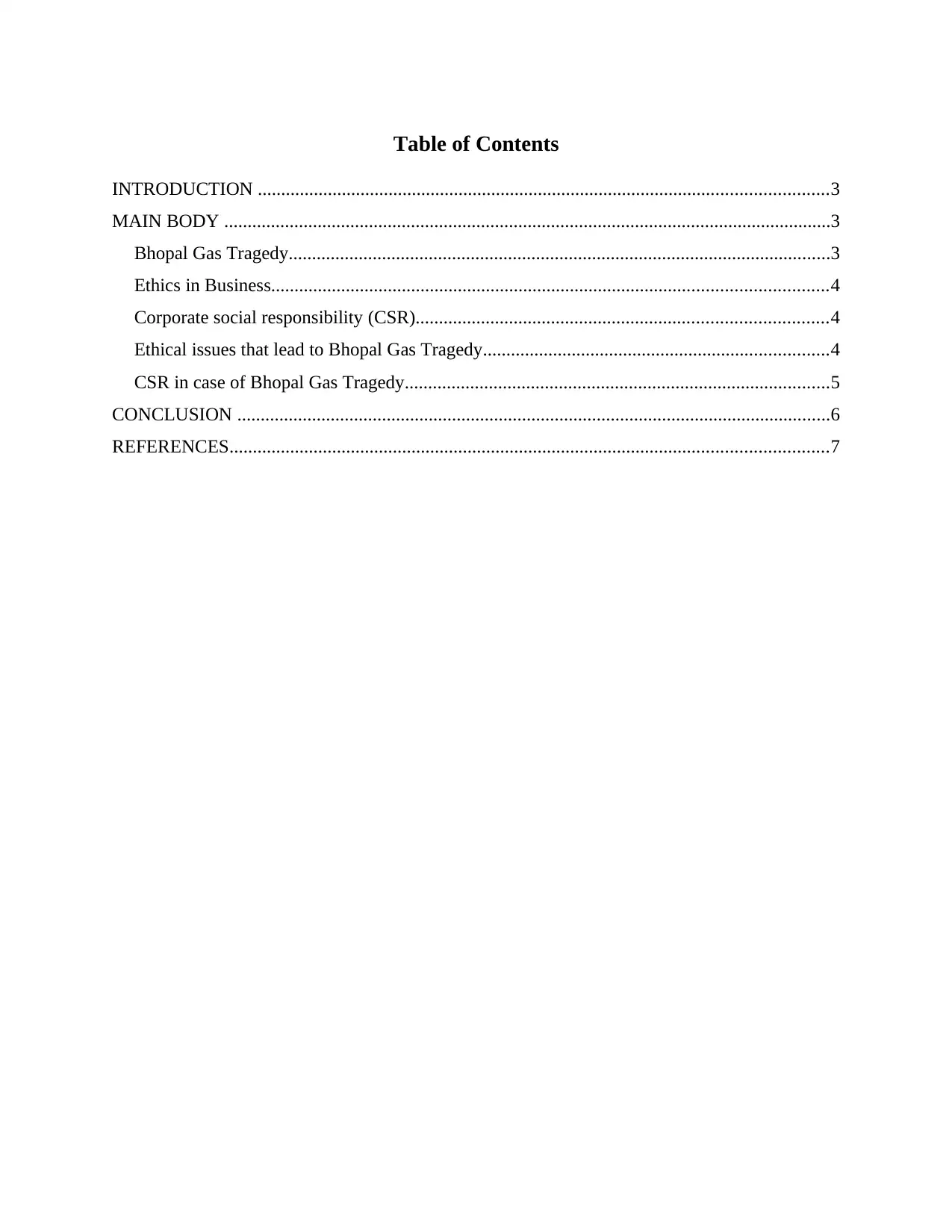
Table of Contents
INTRODUCTION ..........................................................................................................................3
MAIN BODY ..................................................................................................................................3
Bhopal Gas Tragedy....................................................................................................................3
Ethics in Business.......................................................................................................................4
Corporate social responsibility (CSR)........................................................................................4
Ethical issues that lead to Bhopal Gas Tragedy..........................................................................4
CSR in case of Bhopal Gas Tragedy...........................................................................................5
CONCLUSION ...............................................................................................................................6
REFERENCES................................................................................................................................7
INTRODUCTION ..........................................................................................................................3
MAIN BODY ..................................................................................................................................3
Bhopal Gas Tragedy....................................................................................................................3
Ethics in Business.......................................................................................................................4
Corporate social responsibility (CSR)........................................................................................4
Ethical issues that lead to Bhopal Gas Tragedy..........................................................................4
CSR in case of Bhopal Gas Tragedy...........................................................................................5
CONCLUSION ...............................................................................................................................6
REFERENCES................................................................................................................................7
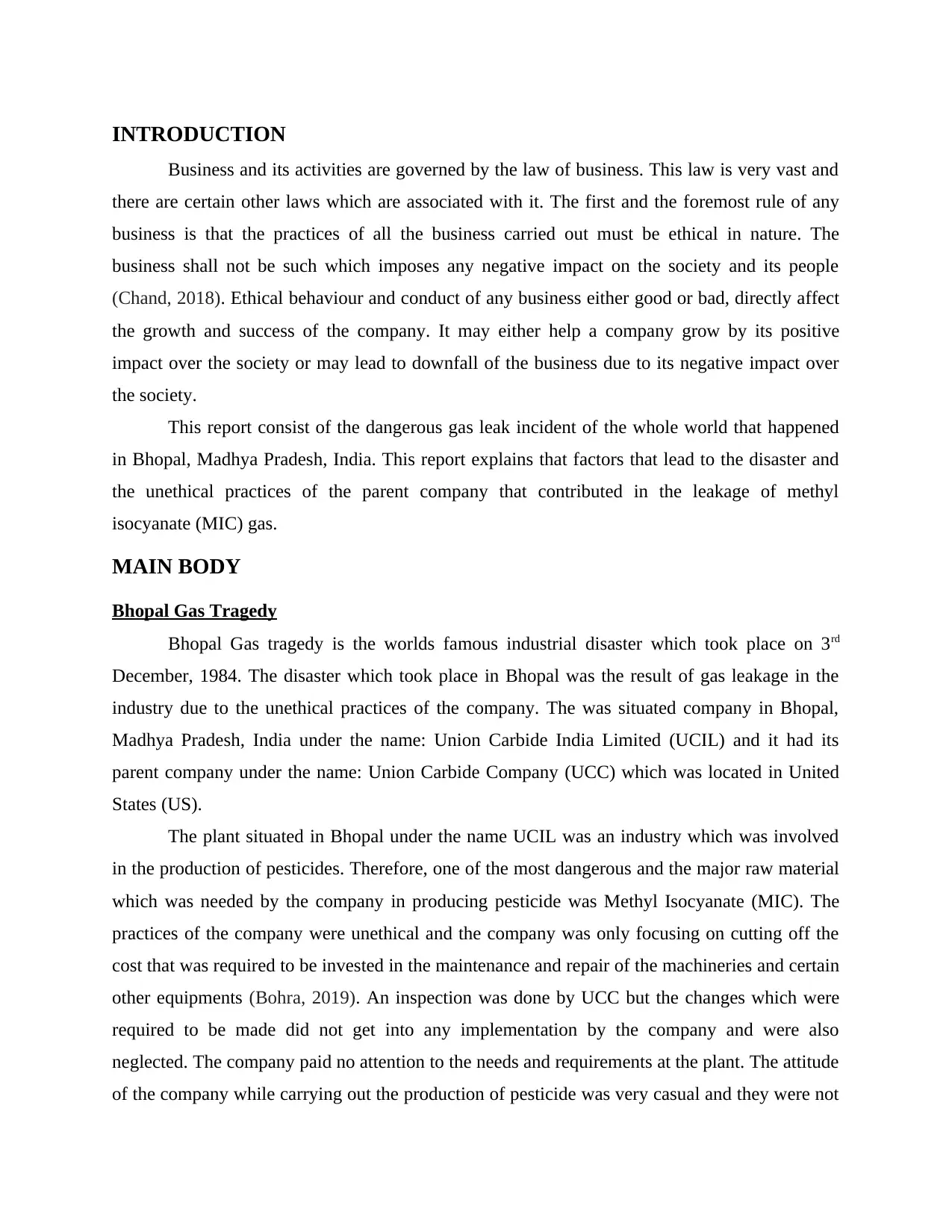
INTRODUCTION
Business and its activities are governed by the law of business. This law is very vast and
there are certain other laws which are associated with it. The first and the foremost rule of any
business is that the practices of all the business carried out must be ethical in nature. The
business shall not be such which imposes any negative impact on the society and its people
(Chand, 2018). Ethical behaviour and conduct of any business either good or bad, directly affect
the growth and success of the company. It may either help a company grow by its positive
impact over the society or may lead to downfall of the business due to its negative impact over
the society.
This report consist of the dangerous gas leak incident of the whole world that happened
in Bhopal, Madhya Pradesh, India. This report explains that factors that lead to the disaster and
the unethical practices of the parent company that contributed in the leakage of methyl
isocyanate (MIC) gas.
MAIN BODY
Bhopal Gas Tragedy
Bhopal Gas tragedy is the worlds famous industrial disaster which took place on 3rd
December, 1984. The disaster which took place in Bhopal was the result of gas leakage in the
industry due to the unethical practices of the company. The was situated company in Bhopal,
Madhya Pradesh, India under the name: Union Carbide India Limited (UCIL) and it had its
parent company under the name: Union Carbide Company (UCC) which was located in United
States (US).
The plant situated in Bhopal under the name UCIL was an industry which was involved
in the production of pesticides. Therefore, one of the most dangerous and the major raw material
which was needed by the company in producing pesticide was Methyl Isocyanate (MIC). The
practices of the company were unethical and the company was only focusing on cutting off the
cost that was required to be invested in the maintenance and repair of the machineries and certain
other equipments (Bohra, 2019). An inspection was done by UCC but the changes which were
required to be made did not get into any implementation by the company and were also
neglected. The company paid no attention to the needs and requirements at the plant. The attitude
of the company while carrying out the production of pesticide was very casual and they were not
Business and its activities are governed by the law of business. This law is very vast and
there are certain other laws which are associated with it. The first and the foremost rule of any
business is that the practices of all the business carried out must be ethical in nature. The
business shall not be such which imposes any negative impact on the society and its people
(Chand, 2018). Ethical behaviour and conduct of any business either good or bad, directly affect
the growth and success of the company. It may either help a company grow by its positive
impact over the society or may lead to downfall of the business due to its negative impact over
the society.
This report consist of the dangerous gas leak incident of the whole world that happened
in Bhopal, Madhya Pradesh, India. This report explains that factors that lead to the disaster and
the unethical practices of the parent company that contributed in the leakage of methyl
isocyanate (MIC) gas.
MAIN BODY
Bhopal Gas Tragedy
Bhopal Gas tragedy is the worlds famous industrial disaster which took place on 3rd
December, 1984. The disaster which took place in Bhopal was the result of gas leakage in the
industry due to the unethical practices of the company. The was situated company in Bhopal,
Madhya Pradesh, India under the name: Union Carbide India Limited (UCIL) and it had its
parent company under the name: Union Carbide Company (UCC) which was located in United
States (US).
The plant situated in Bhopal under the name UCIL was an industry which was involved
in the production of pesticides. Therefore, one of the most dangerous and the major raw material
which was needed by the company in producing pesticide was Methyl Isocyanate (MIC). The
practices of the company were unethical and the company was only focusing on cutting off the
cost that was required to be invested in the maintenance and repair of the machineries and certain
other equipments (Bohra, 2019). An inspection was done by UCC but the changes which were
required to be made did not get into any implementation by the company and were also
neglected. The company paid no attention to the needs and requirements at the plant. The attitude
of the company while carrying out the production of pesticide was very casual and they were not
⊘ This is a preview!⊘
Do you want full access?
Subscribe today to unlock all pages.

Trusted by 1+ million students worldwide
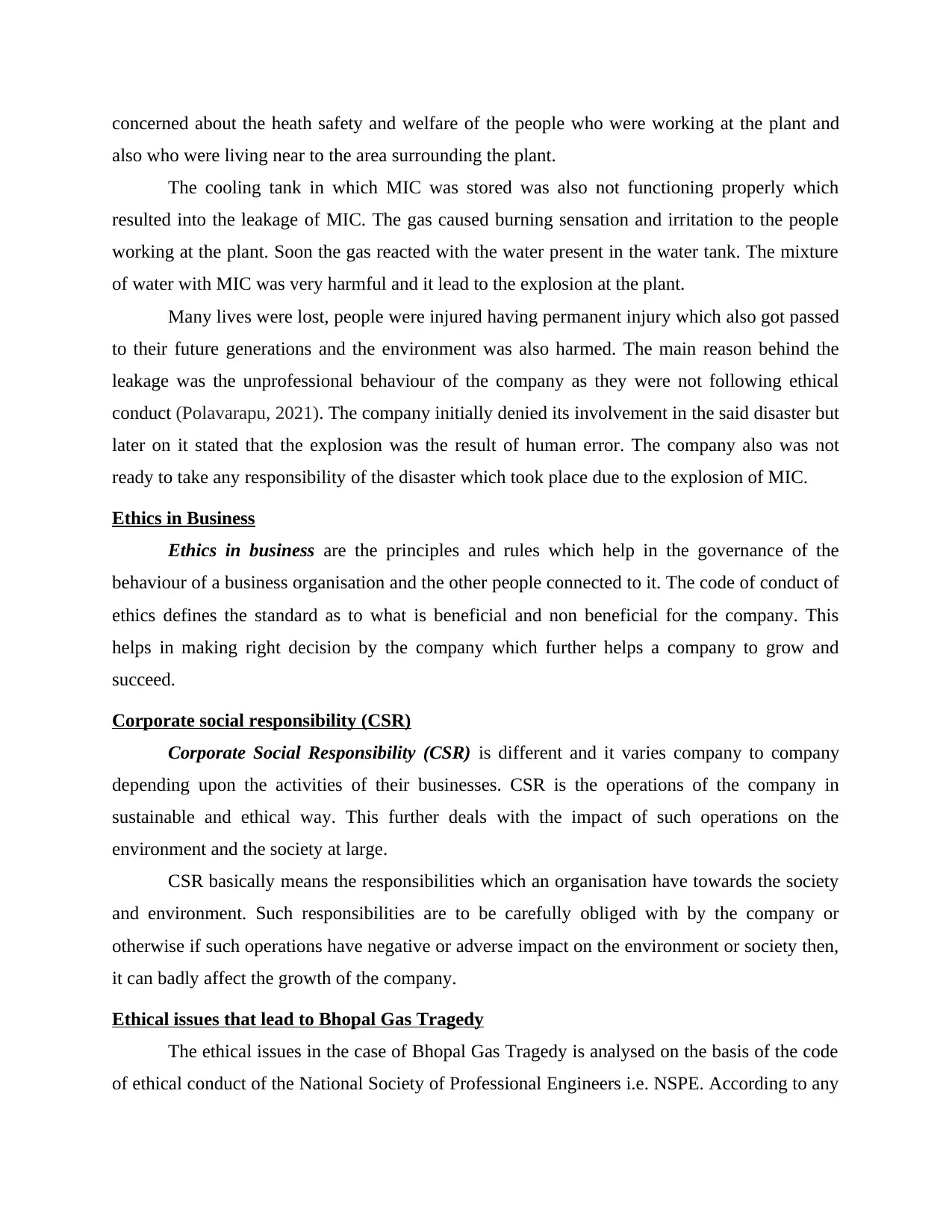
concerned about the heath safety and welfare of the people who were working at the plant and
also who were living near to the area surrounding the plant.
The cooling tank in which MIC was stored was also not functioning properly which
resulted into the leakage of MIC. The gas caused burning sensation and irritation to the people
working at the plant. Soon the gas reacted with the water present in the water tank. The mixture
of water with MIC was very harmful and it lead to the explosion at the plant.
Many lives were lost, people were injured having permanent injury which also got passed
to their future generations and the environment was also harmed. The main reason behind the
leakage was the unprofessional behaviour of the company as they were not following ethical
conduct (Polavarapu, 2021). The company initially denied its involvement in the said disaster but
later on it stated that the explosion was the result of human error. The company also was not
ready to take any responsibility of the disaster which took place due to the explosion of MIC.
Ethics in Business
Ethics in business are the principles and rules which help in the governance of the
behaviour of a business organisation and the other people connected to it. The code of conduct of
ethics defines the standard as to what is beneficial and non beneficial for the company. This
helps in making right decision by the company which further helps a company to grow and
succeed.
Corporate social responsibility (CSR)
Corporate Social Responsibility (CSR) is different and it varies company to company
depending upon the activities of their businesses. CSR is the operations of the company in
sustainable and ethical way. This further deals with the impact of such operations on the
environment and the society at large.
CSR basically means the responsibilities which an organisation have towards the society
and environment. Such responsibilities are to be carefully obliged with by the company or
otherwise if such operations have negative or adverse impact on the environment or society then,
it can badly affect the growth of the company.
Ethical issues that lead to Bhopal Gas Tragedy
The ethical issues in the case of Bhopal Gas Tragedy is analysed on the basis of the code
of ethical conduct of the National Society of Professional Engineers i.e. NSPE. According to any
also who were living near to the area surrounding the plant.
The cooling tank in which MIC was stored was also not functioning properly which
resulted into the leakage of MIC. The gas caused burning sensation and irritation to the people
working at the plant. Soon the gas reacted with the water present in the water tank. The mixture
of water with MIC was very harmful and it lead to the explosion at the plant.
Many lives were lost, people were injured having permanent injury which also got passed
to their future generations and the environment was also harmed. The main reason behind the
leakage was the unprofessional behaviour of the company as they were not following ethical
conduct (Polavarapu, 2021). The company initially denied its involvement in the said disaster but
later on it stated that the explosion was the result of human error. The company also was not
ready to take any responsibility of the disaster which took place due to the explosion of MIC.
Ethics in Business
Ethics in business are the principles and rules which help in the governance of the
behaviour of a business organisation and the other people connected to it. The code of conduct of
ethics defines the standard as to what is beneficial and non beneficial for the company. This
helps in making right decision by the company which further helps a company to grow and
succeed.
Corporate social responsibility (CSR)
Corporate Social Responsibility (CSR) is different and it varies company to company
depending upon the activities of their businesses. CSR is the operations of the company in
sustainable and ethical way. This further deals with the impact of such operations on the
environment and the society at large.
CSR basically means the responsibilities which an organisation have towards the society
and environment. Such responsibilities are to be carefully obliged with by the company or
otherwise if such operations have negative or adverse impact on the environment or society then,
it can badly affect the growth of the company.
Ethical issues that lead to Bhopal Gas Tragedy
The ethical issues in the case of Bhopal Gas Tragedy is analysed on the basis of the code
of ethical conduct of the National Society of Professional Engineers i.e. NSPE. According to any
Paraphrase This Document
Need a fresh take? Get an instant paraphrase of this document with our AI Paraphraser
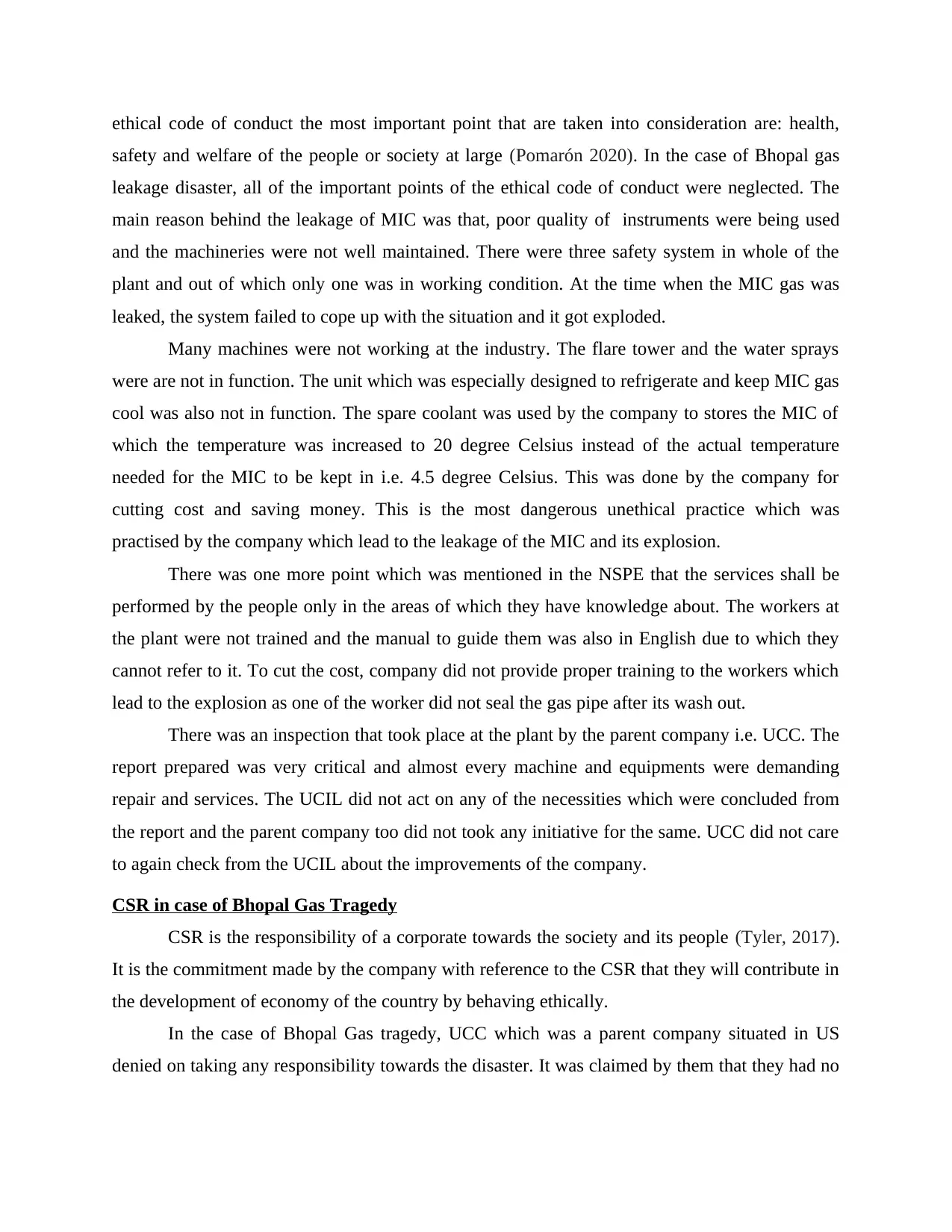
ethical code of conduct the most important point that are taken into consideration are: health,
safety and welfare of the people or society at large (Pomarón 2020). In the case of Bhopal gas
leakage disaster, all of the important points of the ethical code of conduct were neglected. The
main reason behind the leakage of MIC was that, poor quality of instruments were being used
and the machineries were not well maintained. There were three safety system in whole of the
plant and out of which only one was in working condition. At the time when the MIC gas was
leaked, the system failed to cope up with the situation and it got exploded.
Many machines were not working at the industry. The flare tower and the water sprays
were are not in function. The unit which was especially designed to refrigerate and keep MIC gas
cool was also not in function. The spare coolant was used by the company to stores the MIC of
which the temperature was increased to 20 degree Celsius instead of the actual temperature
needed for the MIC to be kept in i.e. 4.5 degree Celsius. This was done by the company for
cutting cost and saving money. This is the most dangerous unethical practice which was
practised by the company which lead to the leakage of the MIC and its explosion.
There was one more point which was mentioned in the NSPE that the services shall be
performed by the people only in the areas of which they have knowledge about. The workers at
the plant were not trained and the manual to guide them was also in English due to which they
cannot refer to it. To cut the cost, company did not provide proper training to the workers which
lead to the explosion as one of the worker did not seal the gas pipe after its wash out.
There was an inspection that took place at the plant by the parent company i.e. UCC. The
report prepared was very critical and almost every machine and equipments were demanding
repair and services. The UCIL did not act on any of the necessities which were concluded from
the report and the parent company too did not took any initiative for the same. UCC did not care
to again check from the UCIL about the improvements of the company.
CSR in case of Bhopal Gas Tragedy
CSR is the responsibility of a corporate towards the society and its people (Tyler, 2017).
It is the commitment made by the company with reference to the CSR that they will contribute in
the development of economy of the country by behaving ethically.
In the case of Bhopal Gas tragedy, UCC which was a parent company situated in US
denied on taking any responsibility towards the disaster. It was claimed by them that they had no
safety and welfare of the people or society at large (Pomarón 2020). In the case of Bhopal gas
leakage disaster, all of the important points of the ethical code of conduct were neglected. The
main reason behind the leakage of MIC was that, poor quality of instruments were being used
and the machineries were not well maintained. There were three safety system in whole of the
plant and out of which only one was in working condition. At the time when the MIC gas was
leaked, the system failed to cope up with the situation and it got exploded.
Many machines were not working at the industry. The flare tower and the water sprays
were are not in function. The unit which was especially designed to refrigerate and keep MIC gas
cool was also not in function. The spare coolant was used by the company to stores the MIC of
which the temperature was increased to 20 degree Celsius instead of the actual temperature
needed for the MIC to be kept in i.e. 4.5 degree Celsius. This was done by the company for
cutting cost and saving money. This is the most dangerous unethical practice which was
practised by the company which lead to the leakage of the MIC and its explosion.
There was one more point which was mentioned in the NSPE that the services shall be
performed by the people only in the areas of which they have knowledge about. The workers at
the plant were not trained and the manual to guide them was also in English due to which they
cannot refer to it. To cut the cost, company did not provide proper training to the workers which
lead to the explosion as one of the worker did not seal the gas pipe after its wash out.
There was an inspection that took place at the plant by the parent company i.e. UCC. The
report prepared was very critical and almost every machine and equipments were demanding
repair and services. The UCIL did not act on any of the necessities which were concluded from
the report and the parent company too did not took any initiative for the same. UCC did not care
to again check from the UCIL about the improvements of the company.
CSR in case of Bhopal Gas Tragedy
CSR is the responsibility of a corporate towards the society and its people (Tyler, 2017).
It is the commitment made by the company with reference to the CSR that they will contribute in
the development of economy of the country by behaving ethically.
In the case of Bhopal Gas tragedy, UCC which was a parent company situated in US
denied on taking any responsibility towards the disaster. It was claimed by them that they had no
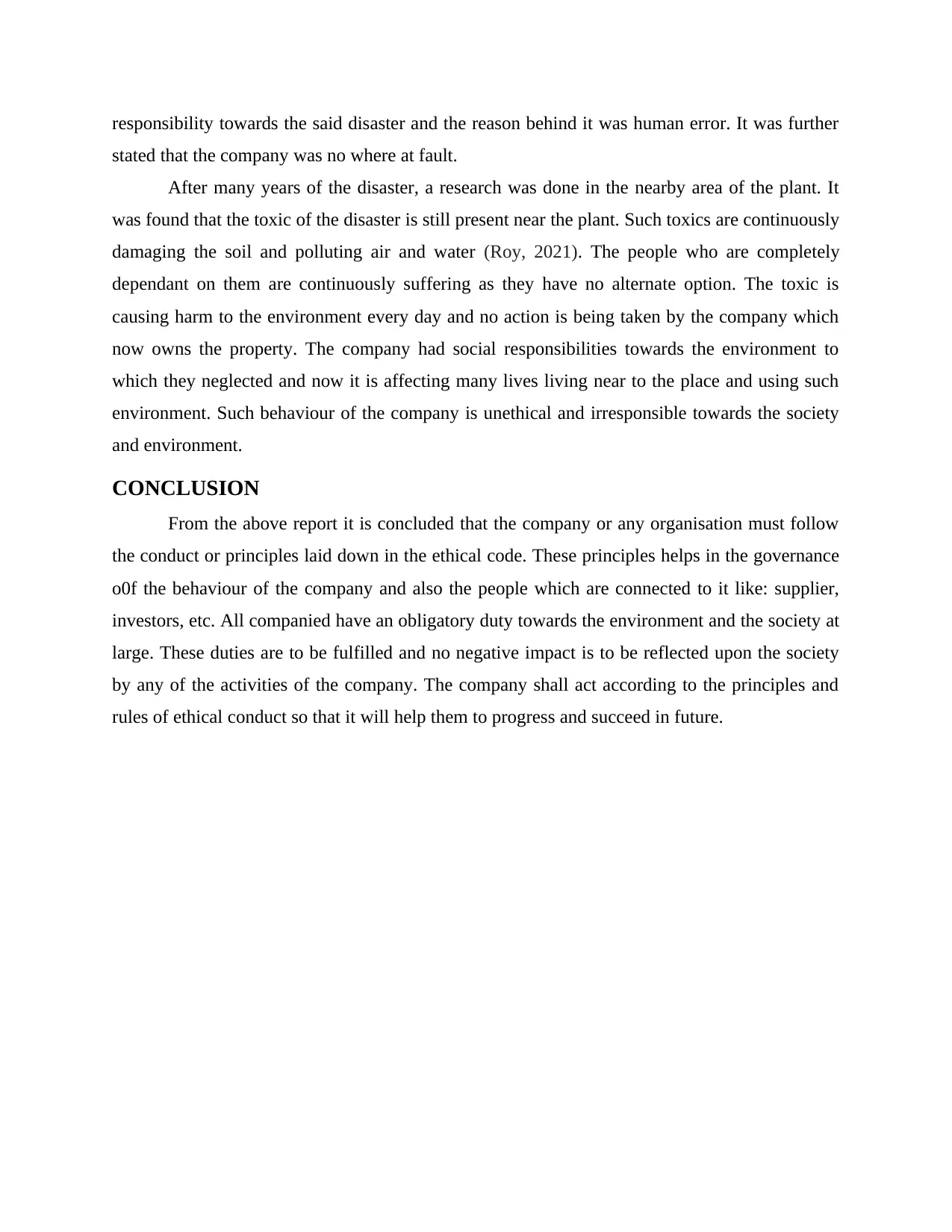
responsibility towards the said disaster and the reason behind it was human error. It was further
stated that the company was no where at fault.
After many years of the disaster, a research was done in the nearby area of the plant. It
was found that the toxic of the disaster is still present near the plant. Such toxics are continuously
damaging the soil and polluting air and water (Roy, 2021). The people who are completely
dependant on them are continuously suffering as they have no alternate option. The toxic is
causing harm to the environment every day and no action is being taken by the company which
now owns the property. The company had social responsibilities towards the environment to
which they neglected and now it is affecting many lives living near to the place and using such
environment. Such behaviour of the company is unethical and irresponsible towards the society
and environment.
CONCLUSION
From the above report it is concluded that the company or any organisation must follow
the conduct or principles laid down in the ethical code. These principles helps in the governance
o0f the behaviour of the company and also the people which are connected to it like: supplier,
investors, etc. All companied have an obligatory duty towards the environment and the society at
large. These duties are to be fulfilled and no negative impact is to be reflected upon the society
by any of the activities of the company. The company shall act according to the principles and
rules of ethical conduct so that it will help them to progress and succeed in future.
stated that the company was no where at fault.
After many years of the disaster, a research was done in the nearby area of the plant. It
was found that the toxic of the disaster is still present near the plant. Such toxics are continuously
damaging the soil and polluting air and water (Roy, 2021). The people who are completely
dependant on them are continuously suffering as they have no alternate option. The toxic is
causing harm to the environment every day and no action is being taken by the company which
now owns the property. The company had social responsibilities towards the environment to
which they neglected and now it is affecting many lives living near to the place and using such
environment. Such behaviour of the company is unethical and irresponsible towards the society
and environment.
CONCLUSION
From the above report it is concluded that the company or any organisation must follow
the conduct or principles laid down in the ethical code. These principles helps in the governance
o0f the behaviour of the company and also the people which are connected to it like: supplier,
investors, etc. All companied have an obligatory duty towards the environment and the society at
large. These duties are to be fulfilled and no negative impact is to be reflected upon the society
by any of the activities of the company. The company shall act according to the principles and
rules of ethical conduct so that it will help them to progress and succeed in future.
⊘ This is a preview!⊘
Do you want full access?
Subscribe today to unlock all pages.

Trusted by 1+ million students worldwide
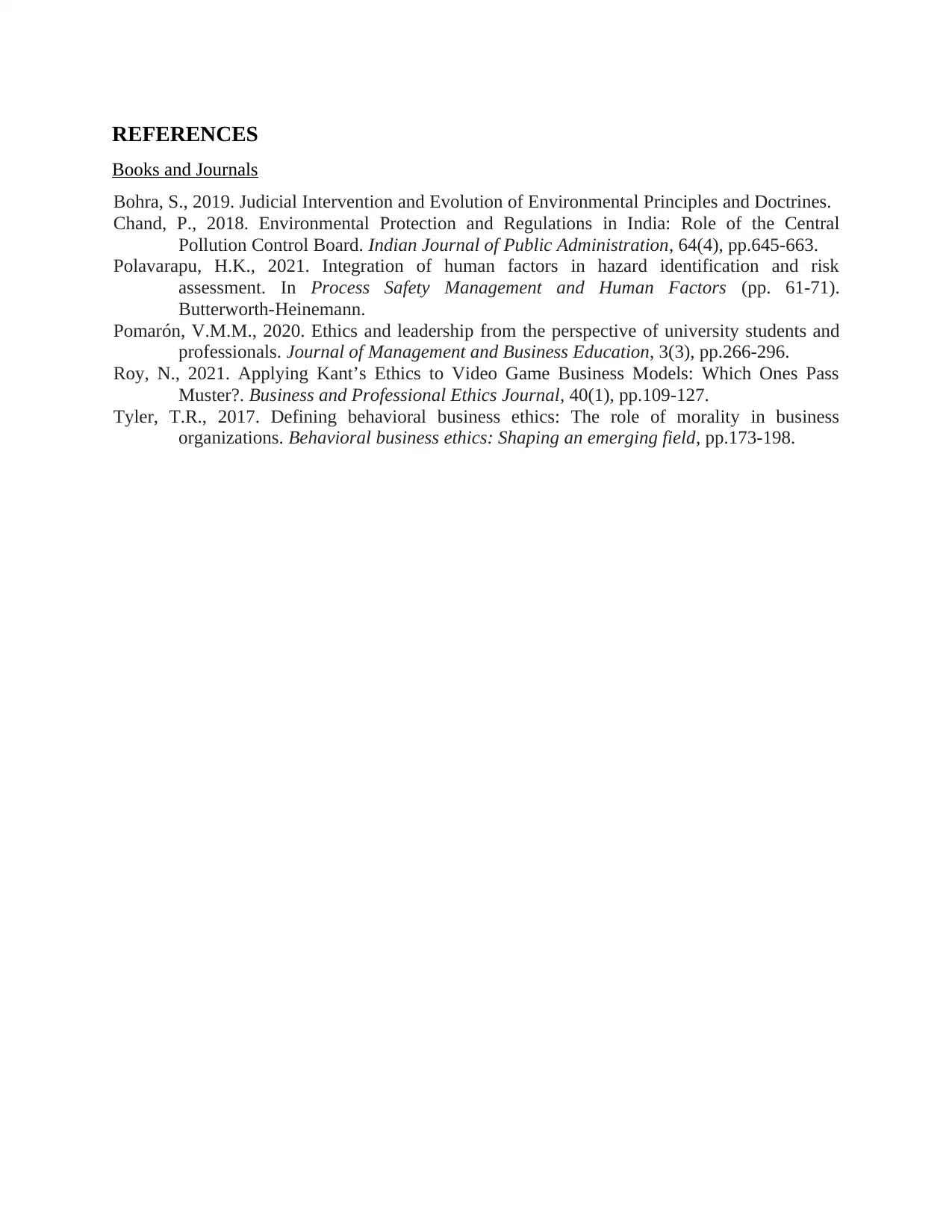
REFERENCES
Books and Journals
Bohra, S., 2019. Judicial Intervention and Evolution of Environmental Principles and Doctrines.
Chand, P., 2018. Environmental Protection and Regulations in India: Role of the Central
Pollution Control Board. Indian Journal of Public Administration, 64(4), pp.645-663.
Polavarapu, H.K., 2021. Integration of human factors in hazard identification and risk
assessment. In Process Safety Management and Human Factors (pp. 61-71).
Butterworth-Heinemann.
Pomarón, V.M.M., 2020. Ethics and leadership from the perspective of university students and
professionals. Journal of Management and Business Education, 3(3), pp.266-296.
Roy, N., 2021. Applying Kant’s Ethics to Video Game Business Models: Which Ones Pass
Muster?. Business and Professional Ethics Journal, 40(1), pp.109-127.
Tyler, T.R., 2017. Defining behavioral business ethics: The role of morality in business
organizations. Behavioral business ethics: Shaping an emerging field, pp.173-198.
Books and Journals
Bohra, S., 2019. Judicial Intervention and Evolution of Environmental Principles and Doctrines.
Chand, P., 2018. Environmental Protection and Regulations in India: Role of the Central
Pollution Control Board. Indian Journal of Public Administration, 64(4), pp.645-663.
Polavarapu, H.K., 2021. Integration of human factors in hazard identification and risk
assessment. In Process Safety Management and Human Factors (pp. 61-71).
Butterworth-Heinemann.
Pomarón, V.M.M., 2020. Ethics and leadership from the perspective of university students and
professionals. Journal of Management and Business Education, 3(3), pp.266-296.
Roy, N., 2021. Applying Kant’s Ethics to Video Game Business Models: Which Ones Pass
Muster?. Business and Professional Ethics Journal, 40(1), pp.109-127.
Tyler, T.R., 2017. Defining behavioral business ethics: The role of morality in business
organizations. Behavioral business ethics: Shaping an emerging field, pp.173-198.
1 out of 7
Related Documents
Your All-in-One AI-Powered Toolkit for Academic Success.
+13062052269
info@desklib.com
Available 24*7 on WhatsApp / Email
![[object Object]](/_next/static/media/star-bottom.7253800d.svg)
Unlock your academic potential
Copyright © 2020–2026 A2Z Services. All Rights Reserved. Developed and managed by ZUCOL.





